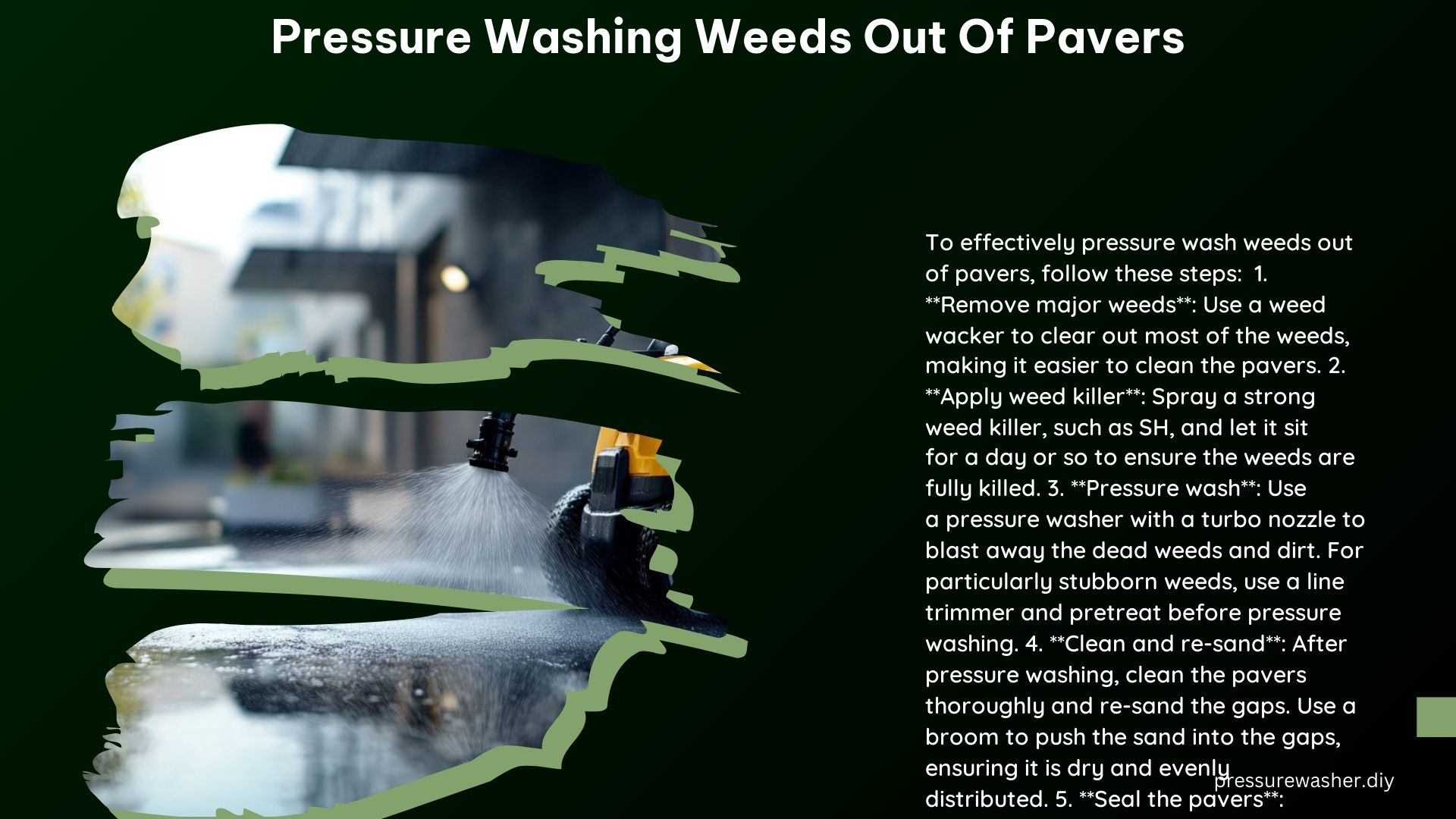Pressure washing is a highly effective method for removing weeds from pavers, but it requires careful consideration of various technical specifications and safety precautions to ensure optimal results. This comprehensive guide will provide you with the necessary information to tackle this task efficiently and effectively.
Understanding the Effectiveness of Pressure Washing
Pressure washing can be a powerful tool in the fight against weeds on pavers, but it’s important to understand its limitations. While pressure washing can effectively dislodge and remove the visible parts of the weeds, it may not always kill the roots, leading to potential regrowth. To address this issue, it’s recommended to use a weed killer before pressure washing to ensure the weeds do not return quickly.
Selecting the Appropriate Pressure Washer and Nozzle

The success of pressure washing in removing weeds from pavers largely depends on the specifications of the pressure washer and the type of nozzle used. Here are the key considerations:
Pressure Washer Specifications
- Pressure Rating: The recommended pressure setting for effectively removing weeds from pavers typically ranges from 1500 psi to 4200 psi. It’s essential to find the right balance between high pressure and avoiding damage to the pavers.
- Flow Rate: A higher flow rate can help to remove weeds more quickly, but it may also wash away the sand between the pavers, requiring re-sanding. The optimal flow rate is typically between 2 to 4 gallons per minute (GPM).
Nozzle Type
- Turbo Nozzle: A turbo nozzle is often recommended for pressure washing pavers, as its concentrated spray pattern helps to dislodge weeds more efficiently. The narrow, high-pressure stream can penetrate deep into the crevices between the pavers.
- Adjustable Nozzle: An adjustable nozzle allows you to vary the spray pattern and pressure, providing more control over the cleaning process and reducing the risk of damage to the pavers.
Preparing the Pavers and Applying Weed Killer
Before pressure washing, it’s essential to prepare the pavers and consider the use of a weed killer to ensure long-lasting results.
Weed Killer Application
- Chemical Weed Killers: Applying a chemical weed killer before pressure washing can help to kill the weeds at the root level, preventing regrowth. It’s important to follow the manufacturer’s instructions and local regulations regarding the use of chemical weed killers.
- Natural Weed Killers: For a more eco-friendly approach, consider using natural weed killers, such as vinegar or salt-based solutions, before pressure washing.
Paver Preparation
- Debris Removal: Ensure that the pavers are free of any loose debris, such as leaves, twigs, or dirt, to allow the pressure washer to effectively target the weeds.
- Surface Cleaning: A light pre-cleaning of the pavers using a stiff-bristle brush can help to loosen any stubborn weeds or moss, making them easier to remove with the pressure washer.
Maintaining Paver Stability and Appearance
After pressure washing, it’s crucial to take additional steps to maintain the stability and appearance of the pavers.
Re-sanding
- Sand Replacement: The high-pressure water from the pressure washer may wash away the sand between the pavers, compromising their stability. Re-sanding the pavers is often necessary to restore their structural integrity.
- Sand Type: Use a high-quality, polymeric sand specifically designed for paver applications to ensure a long-lasting, stable surface.
Paver Sealing
- Sealer Application: Applying a paver sealer after pressure washing can help to prevent future weed growth by sealing the gaps between the pavers, making it more difficult for weeds to take root.
- Sealer Types: Choose a sealer that is compatible with the type of pavers and provides the desired level of protection, such as a penetrating sealer or a topical sealer.
Safety Considerations
When pressure washing weeds from pavers, it’s essential to prioritize safety and consider the potential environmental impact.
Licensing and Regulations
- Chemical Weed Killers: In some areas, the application of chemical weed killers may require a specific license or permit. Be sure to check local regulations before using any chemical products.
Environmental Impact
- Water Runoff: Ensure that the pressure washing process does not contribute to the contamination of nearby water sources or harm any surrounding plant life.
- Waste Disposal: Properly dispose of any waste, such as removed weeds or chemical residues, in accordance with local environmental regulations.
By following the guidelines and technical specifications outlined in this comprehensive guide, you can effectively pressure wash weeds out of pavers while maintaining the stability and appearance of your outdoor surfaces. Remember to prioritize safety, consider the environmental impact, and seek professional assistance if necessary.
